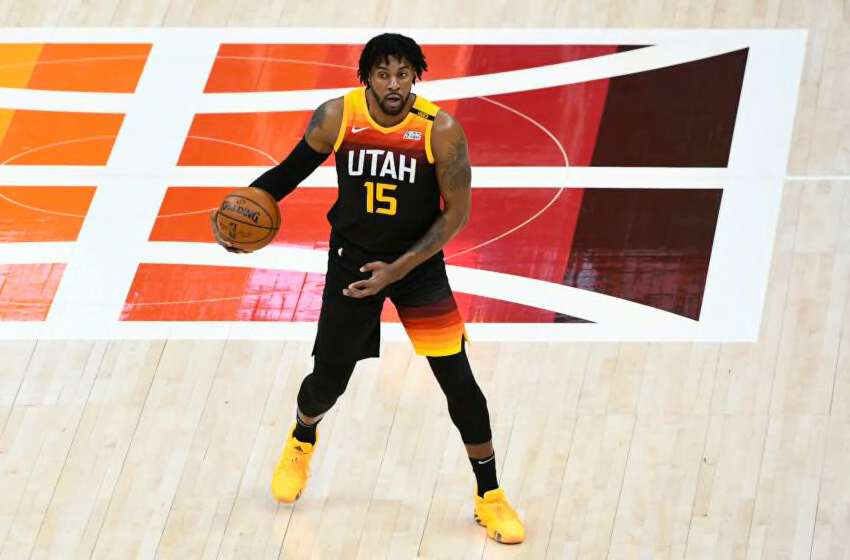
SALT LAKE CITY, UTAH – MAY 12: Derrick Favors #15 of the Utah Jazz in action during a game against the Portland Trail Blazers at Vivint Smart Home Arena on May 12, 2021 in Salt Lake City, Utah. NOTE TO USER: User expressly acknowledges and agrees that, by downloading and/or using this photograph, user is consenting to the terms and conditions of the Getty Images License Agreement. (Photo by Alex Goodlett/Getty Images)
With luxury tax issues in mind, the Utah Jazz paid a steep price to offload Derrick Favors’ contract as soon as possible.
Until further notice, the Utah Jazz will have Donovan Mitchell and Rudy Gobert as their two highest-paid players via the long-term deals each have signed. Paying bench players a lot of money for multiple years won’t be an option. To that end, ESPN’s Adrian Wojnarowski reported on Friday they will send center Derrick Favors and a future first-round pick to the Oklahoma City Thunder for a future second-rounder.
Favors came back to Utah on a three-year deal last offseason, after spending the 2019-20 season with the New Orleans Pelicans. In 68 games this past season, all off the bench (15.3 minutes per game), he averaged 5.4 points, 5.5 rebounds and one blocked shot per game.
Favors is due to make $9.7 million fully guaranteed next season, with a $10.2 million player option for 2022-23. That doesn’t seem like a particularly odorous contract, but Utah has to cut dollars wherever it can.
The Jazz paid big price to offload Derrick Favors’ contract immediately
Utah has its eye on re-signing point guard Mike Conley, which would put them into luxury tax territory anyway. But as ESPN’s Bobby Marks cited, they can do so with less penalty now that they’ve traded Favors and added to Oklahoma City’s already impressive stock pile of first-round picks.
The Jazz sent their 2022 first-round pick (top-six protected) to the Memphis Grizzlies in another trade, so the pick going to Oklahoma City won’t be until 2024 or later. But Utah should be good for years to come, so any first-round pick they’re giving up won’t be a lottery pick in anything other than an absolute worst-case scenario where Mitchell and Gobert both miss significant time in a season.
The Jazz could have waited until into next season to trade Favors, and maybe they wouldn’t have had to attach a first-round pick. But time was of the essence, as they look to do much of anything this offseason. A first-round pick they don’t expect to miss was the price they had to pay to unload the contract, and it was a price Utah willingly paid.